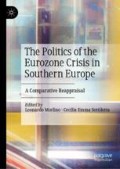Abstract
This book is part of the larger research project EMU Choices, funded by the Horizon 2020 research programme. The project investigates the politics of the reforms enacted during the Eurozone crisis from 2010 to 2015, which, taken together, mark the most significant deepening of European integration since the Maastricht Treaties. The project’s publications study national preference formation and the negotiations on the European stage. By elaborating in-depth insights on Southern European countries, this book makes an important contribution to the literature. Our chapter summarises some of the findings of the EMU Choices research and situates the book within this larger research programme.
Access this chapter
Tax calculation will be finalised at checkout
Purchases are for personal use only
References
Arregui, Javier. 2016. Determinants of Bargaining Satisfaction Across Policy Domains in the European Union Council of Ministers. Journal of Common Market Studies 54 (5): 1105–1122.
Arregui, Javier, and Robert Thomson. 2009. States’ Bargaining Success in the European Union. Journal of European Public Policy 16 (5): 655–676.
Bailer, Stefanie. 2004. Bargaining Success in the European Union: The Impact of Exogenous and Endogenous Power Resources. European Union Politics 5 (1): 99–123.
Copelovitch, Mark, Jeffry Frieden, and Stefanie Walter. 2016. The Political Economy of the Eurocrisis. Comparative Political Studies 49 (7): 811–840.
Cross, James. 2013. Everyone’s a Winner (Almost): Bargaining Success in the Council of Ministers of the European Union. European Union Politics 14 (1): 70–94.
Csehi, Robert, and Uwe Puetter. 2017. Problematizing the Notion of Preference Formation in Research About the Euro Crisis. EMU Choices Working Paper 2017.
Degner, Hanno, and Dirk Leuffen. 2019. Franco-German Cooperation and the Rescuing of the Eurozone. European Union Politics 20 (1): 89–108.
Dyson, Kenneth. 2014. States, Debt and Power: ‘Saints’ and ‘Sinners’ in European History and Integration. Oxford: Oxford University Press.
Falkner, Gerda. 2016. The EU’s Problem-Solving Capacity and Legitimacy in a Crisis Context: A Virtuous or Vicious Circle? West European Politics 39 (5): 953–970.
Golub, Jonathan. 2012. How the European Union Does Not Work: National Bargaining Success in the Council of Ministers. Journal of European Public Policy 19 (9): 1294–1315.
Hall, Peter. 2018. Varieties of Capitalism in Light of the Euro Crisis. Journal of European Public Policy 25 (1): 7–30.
Johnston, Allison, Bob Hancke, and Suman Pant. 2014. Comparative Institutional Advantage in the European Sovereign Debt Crisis. Comparative Political Studies 47 (13): 1771–1800.
Laffan, Birgid. 2016. Europe’s Union in Crisis: Tested and Contested. West European Politics 39 (5): 915–932.
Lehner, Thomas, and Fabio Wasserfallen. 2019. Political Conflict in the Reform of the Eurozone. European Union Politics 20 (1): 45–64.
Lundgren, Magnus, Stefanie Bailer, Lisa Maria Dellmuth, Jonas Tallberg, and Silvana Tarlea. 2019. Bargaining Success in the Reform of the Eurozone. European Union Politics 20 (1): 65–88.
Moravcsik, Andrew. 1998. The Choice for Europe: Social Purpose and State Power from Messina to Maastricht. Ithaca: Cornell University Press.
Moravcsik, Andrew. 2018. Preferences, Power and Institutions in 21st-century Europe. Journal of Common Market Studies 56 (7): 1648–1674.
Obstfeld, Maurice, Alberto Alesina, and Richard Cooper. 1997. Europe’s Gamble. Brookings Papers on Economic Activity 28 (2): 241–317.
Puntscher Riekmann, Sonja. 2018. Europe’s Moments of Truth—Wicked Crises, Good and Bad Consequences. In Structural Reforms for Growth and Cohesion, E. Nowotny et al. (eds.). Cheltenham: Edward Elgar (forthcoming).
Rittel, Horst, and Melvin Webber. 1973. Dilemmas in a General Theory of Planning. Policy Sciences 4 (2): 155–169.
Saurugger, Sabine, and Clement Fontan. 2017. Courts as Political Actors: Resistance to the EU’s New Economic Governance Mechanisms at the Domestic Level. CNRS Working Paper.
Stiglitz, Joseph. 2016. The Euro: How a Common Currency Threatens the Future of Europe. New York: W.W. Norton.
Tarlea, Silvana, Stefanie Bailer, Hanno Degner, Lisa Dellmuth, Dirk Leuffen, Magnus Lundgren, Jonas Tallberg, and Fabio Wasserfallen. 2019. Explaining Governmental Preferences on Economic and Monetary Union Reform. European Union Politics 20 (1): 24–44.
Thomson, Robert. 2011. Resolving Controversy in the European Union: Legislative Decision-Making Before and After Enlargement. Cambridge: Cambridge University Press.
Warren, Thomas, John Scott, Hussein Kassim, Sonja Puntscher Riekmann, Sabine Saurugger, and Shaun Hargraves Heap. 2018. A New Equilibrium? The Changed Politics of Eurozone Reform. Paper Presented at the 9th SGEU-ECPR Conference, June 13–15, Paris.
Wasserfallen, Fabio. 2014. Political and Economic Integration in the EU: The Case of Failed Tax Harmonization. Journal of Common Market Studies 52 (2): 420–435.
Wasserfallen, Fabio, Dirk Leuffen, Zdenek Kudrna, and Hanno Degner. 2019. Analysing European Union Decision-Making During the Eurozone Crisis with New Data. European Union Politics 20 (1): 3–23.
Author information
Authors and Affiliations
Corresponding author
Editor information
Editors and Affiliations
Rights and permissions
Copyright information
© 2020 The Author(s)
About this chapter
Cite this chapter
Riekmann, S.P., Wasserfallen, F. (2020). How Member States Cope with the Eurozone Crisis. In: Morlino, L., Sottilotta, C. (eds) The Politics of the Eurozone Crisis in Southern Europe. Palgrave Macmillan, Cham. https://doi.org/10.1007/978-3-030-24471-2_2
Download citation
DOI: https://doi.org/10.1007/978-3-030-24471-2_2
Published:
Publisher Name: Palgrave Macmillan, Cham
Print ISBN: 978-3-030-24470-5
Online ISBN: 978-3-030-24471-2
eBook Packages: Political Science and International StudiesPolitical Science and International Studies (R0)

